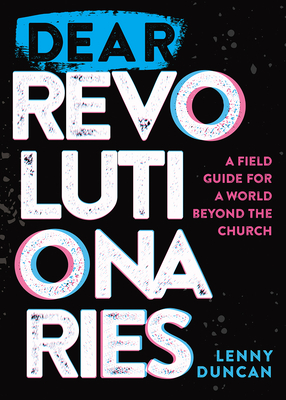Book Review: Dear Revolutionaries: A Field Guide for a World beyond the Church
Reviewed by:
Robert FlemingIn this modern age of random death and mayhem, there are powerful voices shouting for the church to retake its original purpose and redeem every sinner. One of these advocates, Lenny Duncan, a queer public figure, refuses to accept the decline of the church and its profit-loving leaders. His latest manifesto, Dear Revolution: A Field Guide For A World Beyond the Church.
Born in Philadelphia, Duncan is not just another Holy Joe. In 1991, he left his home, hopped on a Greyhound, and sought to find his place in the American Dream. It was the start of a topsy-turvy journey living on the road, often selling drugs and his body to survive. As he once said: “I will be telling you about a world that has done nothing but reject, try to kill, or push aside everything I am.”
Despite the many obstacles hurled at him, Duncan took the road less traveled to become a theologian. He pressed on with his studies to serve as an ordained minister in the Evangelical Lutheran Church of America and, later, assume the pastorship of the Jubilee Collective, a pride-affirming congregation in Vancouver, Washington. His activism and writing came to national attention when he released his debut book, Dear Church, in 2018.
With his follow-up book, United States of Grace, Duncan saw the modern church was no longer an agent of social change but endorsing strait-jacket conservative views. It even promoted Trump as a candidate, although the man’s character was tarnished. When the faithful looked around, they couldn’t recognize the community which served the disinherited and poor.
“Christianity at its core is subversive, but radical evil wants complacency, not subversion,” Duncan noted. “It wants us all comfortable, unchallenged and staring at the stained-glass windows of our church from the inside, while someone who is suffering is staring up at those same windows from the outside. Radical evil wants walls up around our hearts, around our congregations’ lives and around this country. Division is how evil operates.”
Some religious scholars don’t see the church is fine as it is now. However, Duncan believed it is important for these institutions to reform their purpose and spiritual goals. For him, the faithful are walking away, fearful that the dark shadow are spreading across our world. He noted the truth of organized religion was “commoditized, sold, repackaged, then sanitized.”
Duncan zeroed one of the crucial issues confronting the Christians, to live the best life celebrating Jesus’ message. In his words, he asked: What are we the believer, the faithful, and the confused weary disciple of Christ to make all of this? How are we to navigate this new world we find ourselves in?”
He came to the church as a true believer, although he was a man of color, queer, nonbinary, and possessed a shady past. He considered himself as a queer child who had slipped through the system’s hands. Life taught him many things. He learned to be more open about his sexuality and gender identity. All of these parts of Duncan’s personality were frowned on by many sitting on the pews of the institutions built on salvation and redemption.
“We are the offering to end white supremacy in this nation and church,” Duncan wrote. “We can enter this new phase of American theology willingly, or we can fight it every step of the way…We must enter this fray with wild abandon…People are dying, and our secular leaders are more than OK with it. They have assumed the role of empire and couldn’t care less about who gets hurt along the way.”
American theology, Duncan reasoned, has lost the gifts of wisdom, miracles and the mystical by wrapping itself with recruitment of burnouts who are eroding its power. Everyone wanted desperately to change its potential by making an impressive theological shift but the institution no longer knows how to do it. It is suffering from “a much deeper national soul sadness.” It has abandoned the young, the queers, the emotionally damaged, the crippled sick, the exhausted poor, and the tired seniors.
How does Duncan define revolution? In his new book, he explained that it happens, unfolds, individually. One person at a time. Emerges to create community. Differently and magnificently each time. Most importantly, the writer noted that “liberation is a living thing like our God because it is of our God.” He asked that how does the church lead, in unity, during the perhaps the most divisive time in American history? His answer: “You pick a side, and you lead. That’s it. It also happens to be the one thing the modern church refuses to do.”
Someone wrote of Rev. Duncan that he was a zealous voice crying out in the wilderness, like the warm-up act of John The Baptist. He refused to call this book a primer of revolution, but its wise words illuminated the events happening all around us. The summing up of Lenny Duncan came deep near the end of the text: “Revolutionize the mind, the body, the spirit, and the world around you changes.” Good advice for a man who led with his heart and soul, totally unafraid. Liberation, he concluded, finds a way and I have never seen anyone keep freedom down forever. If the modern church will be saved, it will be the faithful like Rev. Lenny Duncan who will toss it a life jacket.


